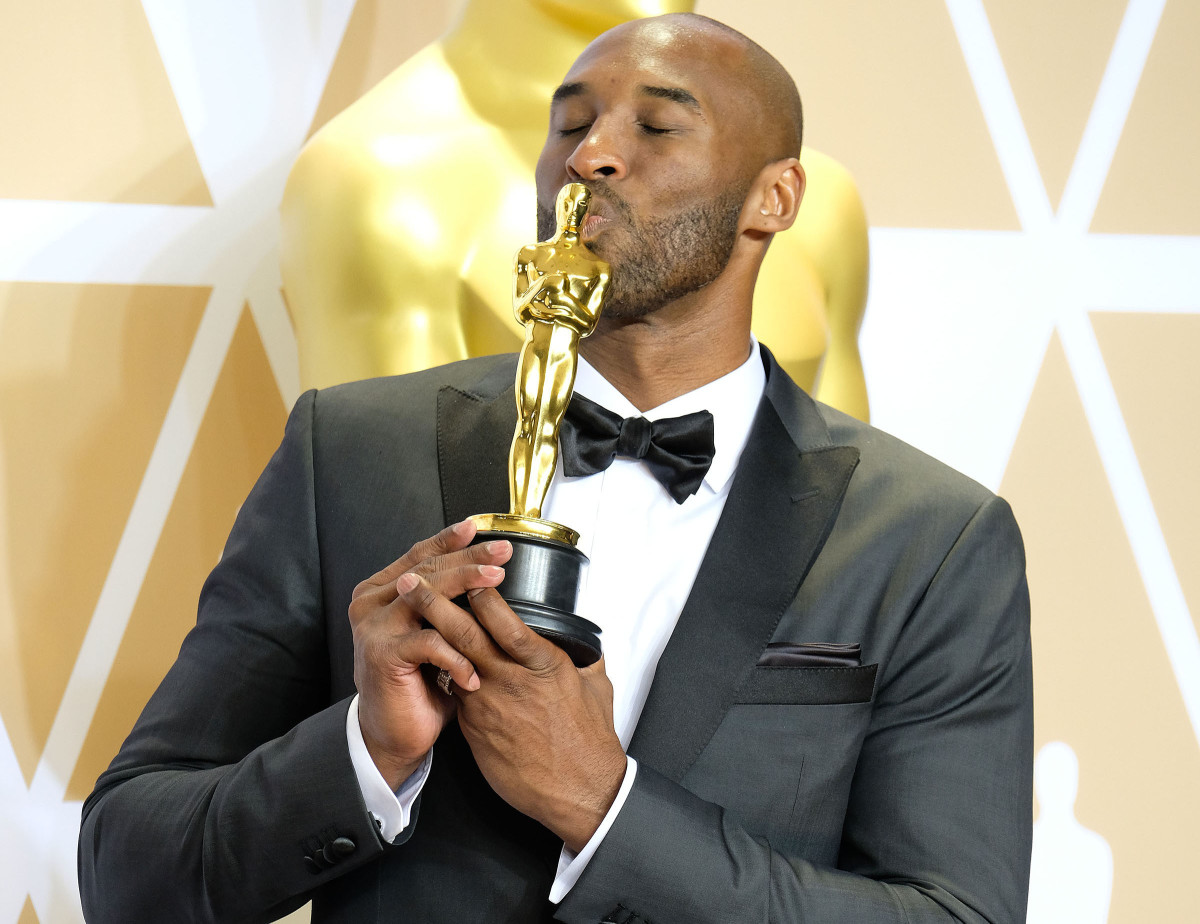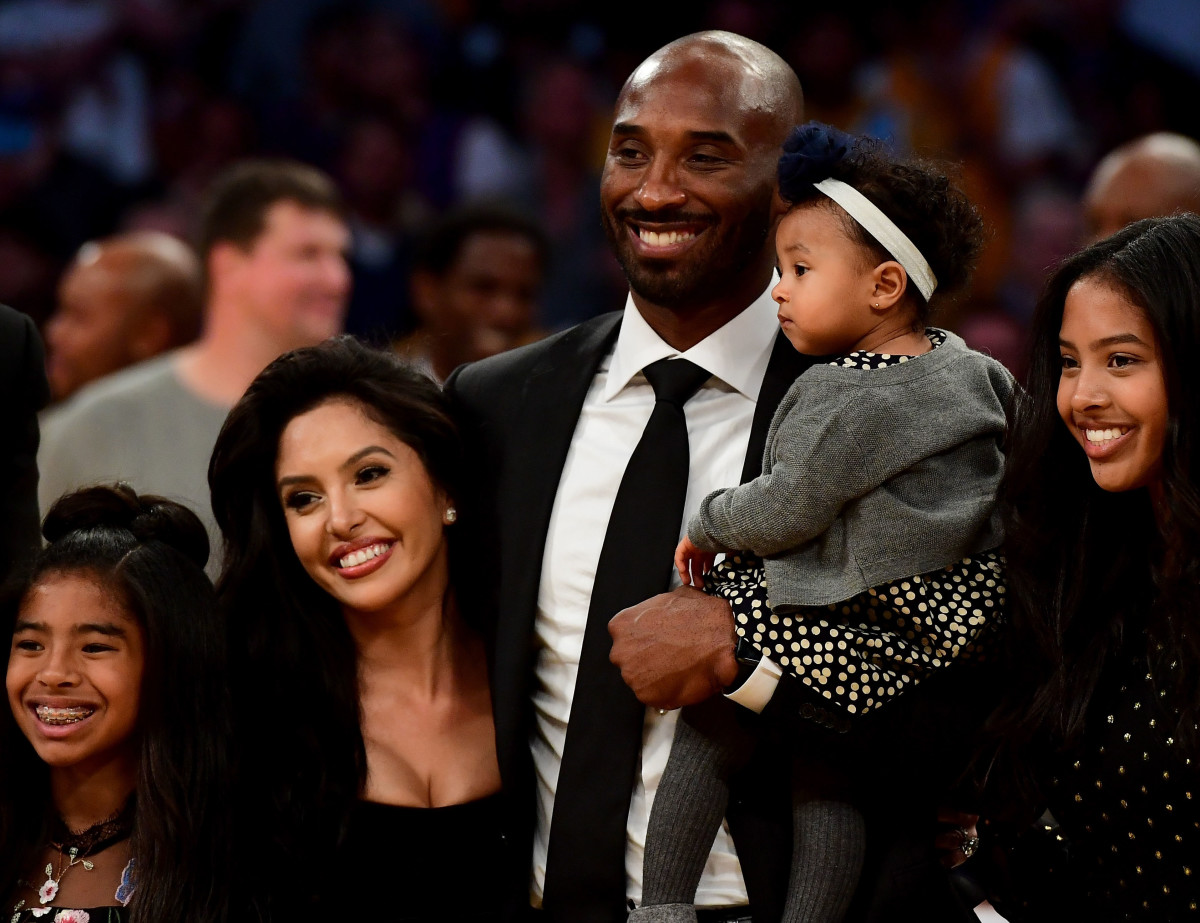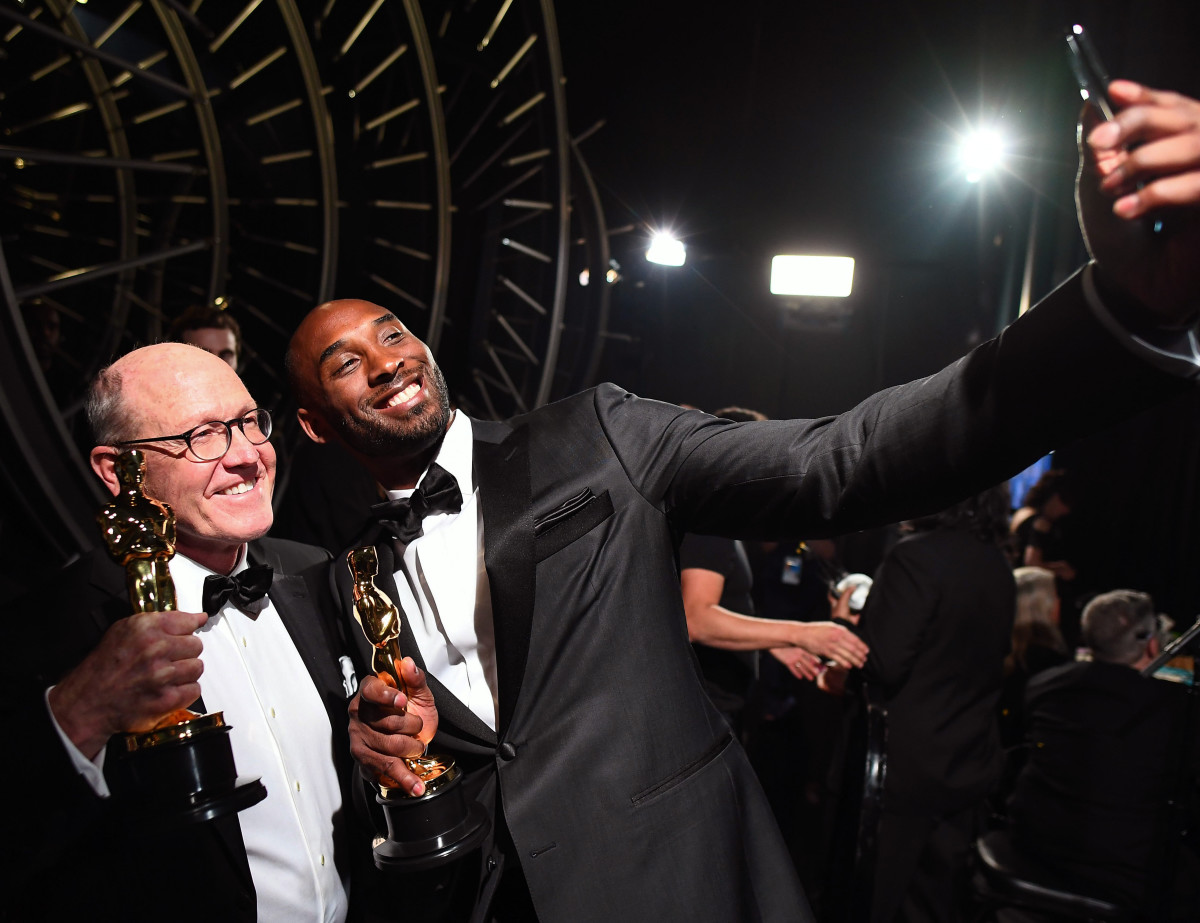Fantastic Voyage: Kobe Bryant Is Now an Entertainment Mogul with a Friendlier Mission

This story appears in the July 16, 2018, issue of Sports Illustrated. For more great storytelling and in-depth analysis, subscribe to the magazine—and get up to 94 percent off the cover price. Click here for more.
The man who fashioned himself a killer snake wants to raise your children.
Like most grand ambitions in 2018, it all starts with a podcast. But since the podcast belongs to Kobe Bean Bryant, it is a bigger production than the common download. Seven actors, two keyboard players and an Emmy-nominated writer sit around a conference table with bagels and LaCroix. They are on the second floor of a beige office building in Costa Mesa, Calif., but the space feels more like an Arts District loft: exposed pipes, Persian rugs, Manzanita trees, twinkle lights. Black-and-white photographs of J.K. Rowling and Walt Disney, Michael Jackson and Oprah Winfrey, line the entryway. A story room, with writers lounging on gray sofas and scribbling across grease boards, is hidden behind thick curtains. A sign that reads zen as f--- leans against the wall in the production studio, waiting to go up.
Fit For The King: LeBron James and the Lakers Form Hollywood's Ultimate Marriage
One building over is the headquarters of the Chargers, arguably the most irrelevant institution in Southland sports, neighbors with perhaps the most popular. Between these bizarre bedfellows is a coffee shop called The Lost Bean. Bryant works at a black desk in a glass cube, scrawling notes on a legal pad because he doesn't like to type. He is preparing for a table read of The Punies, an ensemble podcast for children that he conceived two years ago while watching A Charlie Brown Thanksgiving with his family, an annual tradition. He began jotting descriptions of characters for his athletically inclined Peanuts: Puny Pete, the lovable loser; B.B. LaBelle, the bossy leader; Gordo Lockett, the affable oddball; Kimberly Spice, the smart one; Lilly Sparks, the hyper one; Clark Mayhoff, the troublesome one. The crew has nothing in common except a passion for sports, from surfing to soapbox derby.
When Bryant is ready for the read, he rises from his desk in unlaced Nikes and pushes his swivel chair to the conference table. The actors, mostly twentysomething and talented, fall silent. The basketball player they watched score 81 points in a game and win five NBA championships over 20 seasons with the Lakers is now their director. "You're all kids at the park," Bryant announces. "Your parents aren't here. Have fun. Let it rip." He sinks into his chair and closes his eyes. It is a podcast, after all, so only the voices matter. They tell stories, sing songs ("Coaches Are People Too") and break for make-believe commercials ("Squeakless sneakers! Sneak up on your opponent without a sound!"). Bryant stifles laughs before the punch lines. He seems to have memorized the script, penned by Jon Haller.
"You and I grew up on The Sandlot," Bryant says later. "That was fun. Fun, fun, fun. We're trying to do the same thing here. And within the fun hide some fundamental elements of truth." Dear Basketball, the Academy Award-winning animated short based on the poem announcing his retirement, was only an opening act. So was Detail, his show for ESPN, deconstructing video of individual NBA playoff performances this spring. Same with The Punies, out on Aug. 25. Bryant's larger vision won't come into focus until next year, when he will release three young-adult novels written by fantasy-genre authors, all unfolding in a fictional universe where nothing is real except the sports.
Go West, Big Man: The Logo on LeBron James and the Allure of Los Angeles
"If Harry Potter and the Olympics had a baby, that would be the world we're trying to communicate," Bryant says. "There's fantasy—dreamlike, magical elements—but it's a magic kids can experience." He discovered this world, which he calls Granity, during his last training camp at the Hilton Hawaiian Village in Honolulu. Bryant had suffered three season-ending injuries in a row and recognized his basketball career was waning. He wrestled with what to do afterward. He sounded, for a moment, like a Lost Bean. "What I love," Bryant said one rainy afternoon at the Hilton three years ago, "is storytelling. I love the idea of creative content, whether it's mythology or animation, written or film, that can inspire people and give them something tangible they can use in their own lives."
He had gone to school in Italy, studying the heroic moves of Hector and Achilles, reading The Iliad in Latin. He viewed athletes as gods, none more divine than Michael Jordan, the Jumpman's hops his superpower. As Bryant entered Jordan's stratosphere, he formulated a mythic persona for himself, manic and venomous. "You need to have a villain, an antagonist, and for a long time I've been this Black Mamba character," Bryant said that day in Hawaii. "But when I go full bore into my second act, I think they will know me for something else." Bryant barely slept in Honolulu, filling five of his legal pads with ruminations about Granity, a dreamscape reminiscent of Disneyland and galaxies far, far away. "I came up with the name of the world, the history, the rules, the kingdoms," he recalls. "It was like, 'How do I keep going bigger to create a runway so massive that creatives can drop into it and tell different kinds of stories?'"
The image of the Mamba, relentless and obsessive, fed the perception that he would be lost without the competitive outlet that hoops provided. When Bryant left Hawaii, Dear Basketball was still almost two months from publication, but his retirement plan was in place.

Bryant employs 10 full-time staffers—his chief marketing officer, two writers, a producer and a development team—but most days he beats them all to the office. He is typically there from 8 a.m. to 2 p.m., when he leaves to pick up his daughters from school. It is an early departure, but he can't stand being at the back of the carpool line, so he parks and sings jingles he writes for his animated "Musecage" segments on ESPN. He plays one that he recorded on his phone about Celtics coach Brad Stevens:
You can see what happens, I can see why, I can see adjustments made in real time.
You can see who's open, I can tell you how and why, For this is a game of the mind.

Bryant normally returns to the office around 3:30, logs another couple of hours and then heads to practice. He vowed he would never coach but broke his promise for Gianna's 12-year-old AAU team, the Mambas, which he runs like the 2010 Lakers. The Mambas practice five days a week. They run the triangle offense. They wear Nike-issued black-and-white uniforms. Bryant encourages them to spend entire days without using their right hands. "Brush your teeth with your left," he instructs. He pores over practice tape and calls UConn coach Geno Auriemma for advice. Gianna, whose jutted jaw and silky fadeaway were inherited from her father, hopes to play for the Huskies.
Coaching the Mambas allows Bryant access to the minds of 12-year-olds, his private focus group. He does not play golf. He does not watch League Pass. He still doesn't have many friends or get much sleep. He tweets about the NBA, provoking much debate, and he spoke recently with LeBron James, welcoming him to the purple pantheon. But he was not glued to free-agent updates. He prefers to know what kids are consuming. "I have a 10-year-old boy and an eight-year-old girl," says Rob Pelinka, Bryant's former agent, now the Lakers' GM. "If he shows them something he's working on, and gets a positive reaction, he laughs out loud. His emotional response is palpable."
The three novels set for 2019 are nearing completion and two more for '20 are in the works. The authors are freelancers spread across the U.S. and Canada, while the editors are all in New York City. Bryant checks in with them regularly, though not as often as he used to. "I trust them," he says. "They've taken my ideas and made them 1,000 times better." He is already meeting with Hollywood studios about turning the books into films. One project he believes would work best as a musical. Scoff at the notion of Bryant on Broadway, but the Oscar affords credibility other athletes can't touch.
Production companies have become the latest extravagance for NBA players, like Sprinter vans and personal chefs. They top credits and pocket checks without ever having to read a script or visit a set. "I've gotten a lot of those offers," Bryant laughs, "to executive produce shows and documentaries. I say no to all of them. If I'm going to put my name on something, I'm going to invest the time and really work on it. That's why we don't do many things here. But the things we do, we turn over and over and over again." When puppeteers originally introduced him to his "Musecage" co-star, a high-pitched purple snake named Little Mamba, Bryant didn't approve of the character's texture and requested that its fabric be changed.
"The first time he came over here, I thought for sure he'd be disappointed, because he'd been visiting bigger studios and our place is just a tiny duplex in West Hollywood," says Glen Keane, the famed animator behind The Little Mermaid, Beauty and the Beast, Aladdin and Pocahontas. "He stopped in our little living room, transformed into a story room, and I imagined him thinking, What am I getting myself into? This doesn't look like a big-time studio. He said, 'It's perfect. It's real.'"

Bryant hired Keane to animate Dear Basketball, a love poem that required two drafts. In the first, Bryant was angry at the game for abandoning him. In the final version, he was grateful to it, for sticking with him so long. When they won the Academy Award, Keane glanced at Bryant, frozen in his tux. "I'd never seen him the way he was in that moment," Keane recalls. "Usually, he's very connected and engaged, but he wasn't moving. I told him, 'Kobe, we've got to go, they only give us 45 seconds.'" The mention of time broke his daze. After staggering to the stage, Bryant located the clock, which seemed to steady him. Keane noticed him staring at the numbers, visibly counting down. He was trying to beat another buzzer.
"What should I do next," Bryant asked Keane after the Oscars.
"We did a short," Keane replied. "Go long."

The Granity novels will feature gods, kings, wizards and a whole lot of regular nine-to-12-year-old kids, but Kobe Bryant is missing. "He's not in any of this," says chief marketing officer Molly Carter. "The way he processes emotion and dealt with obstacles, that's what shows up." There is also no Mamba character in The Punies, though when Keane read the script, he still saw Bryant all over the page.
"It's a little like Dorothy with the Tin Man, the Scarecrow and the Cowardly Lion," Keane says. "There are aspects of her in all those characters, and there are aspects of him in all these characters, even if he doesn't know it. They're like an exploded Kobe. They've all got a little piece of him." You can sense his vulnerability in Puny Pete, which he often disguised, and his conviction through B.B. LaBelle, which he never did. In "Coaches Are People Too," a duet sung by Kimberly and Clark, Kobe seems less like the guy Mike D'Antoni knew, and more like the one Gianna does: "They may yell and scream, they may blow their whistle. They may throw their clipboard like a ballistic missile. But coaching is hard, that's a matter of fact. Takes time, takes patience, it's like herding cats."
Shaquille O'Neal Q&A: LeBron James's Big Move, the Lakers and More
After the 70-minute table read, the actors stare anxiously at Bryant, who finally opens his eyes. "That was awesome," he says. "You played off each other really well. You were really smooth. Take the material home, study it, and you'll fall more in line with your characters. You'll get comfortable and find some beats where you can add a little laughter. More work to be done, but we'll get there." As they scatter, he approaches them individually. "Work on your lines together, two hours a day. Practice." He wonders whether, in the surfboard sketch, they should record their parts while standing on actual boards.
When they leave, Bryant retreats to his glass cube. He has to make a scheduled call. Back behind his desk, he punches in the number and waits, until Steven Spielberg answers.
